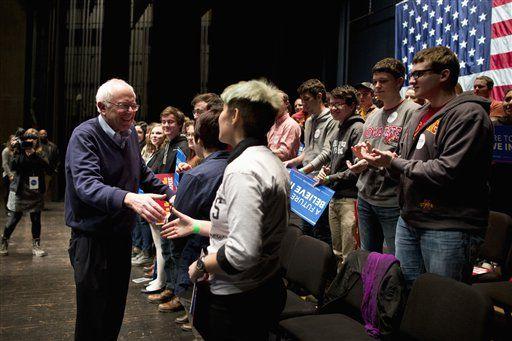Vermont Sen. Bernie Sanders is finally meeting and exceeding Hillary Clinton’s poll numbers in Iowa and New Hampshire. But if he wants to be America’s first democratic socialist president, we need to focus on his foreign policy.
Sanders spends the most time talking about the Middle East, specifically Iran and the Islamic State group. He said he wants to “move aggressively” in normalizing relations with Iran. For the Islamic State group, Sanders wants a pan-Muslim military coalition to fight while keeping U.S. boots off the ground — a remedy President Obama prescribed.
On Israel and Palestine, Sanders sides with the traditional U.S. stance. He wants a two-state solution to make both the Palestinians and the Israelis happy. But it doesn’t take a genius to conclude that Bernie Sanders and Benjamin Netanyahu will not see eye-to-eye on many issues, especially Iran and ways to ensure Israel’s security. Netanyahu supports military expansion, while Sanders supports diplomacy and economic sanctions.
Over the past few months, I have supported Sanders with the usual primary-election-induced fervor of finding your favorite flavor of candidate and wearing their name on fashionable accessories. I love Sanders’ willingness to radically rethink domestic policy while challenging the establishment in order to bring about better living conditions and reduce income inequality.
However, Sanders’ foreign policy lacks that spark of vitality his domestic policy holds. Sanders hasn’t told us how he expects us to aggressively normalize relations with Iran, yet that is his strongest foreign policy stance.
Furthermore, 10 security experts expressed their concerns regarding this course of action in a letter released by the Clinton campaign in January. The balance of power in the Middle East, from the tribal to the international level, is very fragile, and any sweeping moves could set us on the path to further conflict. If we have learned anything from the Arab Spring and the Iran nuclear deal, it is that the status quo prevents large-scale catastrophe in the Middle East, even if that status quo is undesirable.
After that, the house of cards comes down. Sanders’ dream of a pan-Muslim coalition fighting ISIS is a fantasy after you spend two seconds thinking about it. Saudi Arabia and Iran working together to stop a Sunni extremist group in Syria? Maybe they’ll find a unicorn in the Middle East, too.
A two-state solution for Israel and Palestine? Israel is currently dealing with a spate of Palestinian terrorism, and relations between Israel and Palestine are at an all time low. Where is that firebrand leader we see when Sanders discusses domestic policy? On his website, he calls the conflict “depressing and difficult,” and the small space allotted to it leaves me feeling unimpressed.
This election cycle is one of the most important in recent U.S. history.
Whatever the American people elect to do will set the course for the rest of the 21st century. Sanders is riding a wave of populism, claiming he is fighting to bring down the political establishment. But his foreign policy is anything but radical, and when it is, it comes off as potentially dangerous to the broader U.S. strategy.
What exactly is Sanders’ foreign policy strategy — his overall goal as commander in chief? He’s said nothing concrete.
If Sanders wants to be president, he needs to address these issues immediately. Not tomorrow. Not during the general election. Now.
Hopefully he doesn’t disappoint.
David Schneider is a 20-year-old religious studies sophomore from New Orleans, Louisiana. You can reach him on Twitter @NolaDavidS.
OPINION: Bernie’s in the lead…now what?
By David Schneider
January 25, 2016

Jae C. Hong
Democratic presidential candidate, Sen. Bernie Sanders, I-Vt. shakes hands with students after speaking at a campaign event on the campus of Iowa State University, Monday, Jan. 25, 2016, in Ames, Iowa. (AP Photo/Jae C. Hong)
More to Discover













